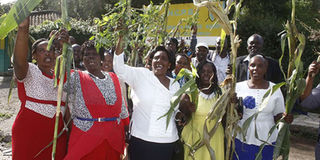Rogue State agents, cartels unite to kill maize sector

Maize farmers protest outside the National Cereals and Produce Board offices in Nakuru on August 22, 2018 over delayed payment. PHOTO | FILE | NATION MEDIA GROUP
What you need to know:
- And while the produce went to waste in 2017 because of storage, aflatoxin, and other pests, in 2015, Kenya destroyed 754,015 bags of maize worth Sh2 billion that had been kept in stores for seven years.
- While volume of maize production and area under cultivation have expanded since Kenya’s independence, the country has only managed to increase its yield per hectare by 40,000.
Last year, two related events occurred in the maize sub-sector leading to a devastating and painful effect that now threatens the continued farming of the crop that accounts for three percent of Kenya’s gross domestic product.
Following a deficit of 2.4 million bags of the staple food, the government opened the floodgates for the importation of the grain, leading to Sh40.3 billion worth of maize flooding the market, more than 10 times those Kenya had brought in the previous year (Sh3.6 billion).
In the same year when the imports shot up more than 10 times, Kenya allowed 514 metric tonnes of its maize to go to waste, up from the 491 in 2016.
CARTELS
And as the government on Thursday started releasing part of the Sh1.4 billion to 900 farmers who were vetted early this year, the effects of the two actions are coming back to haunt the country, and might, in the end, affect the production of the staple food.
“Instead of the government supporting farmers, they side with the cartels by opening the importation window for them, and looking the other way by not regulating the importation,” Mr Kipkorir Menjo of the Kenya Farmers Association (KFA) told the Nation on Thursday.
The current problem in the sub-sector tells the story of a country that, while it depends on small-scale farmers to grow its staple food that estimates say caters for 80 percent of its population, has also spent its time protecting cartels that import at will and cash in at the expense of the farmers.
The country consumes about three million 90kg bags every month.
DROUGHT
And while the produce went to waste in 2017 because of storage, aflatoxin, and other pests, in 2015, Kenya destroyed 754,015 bags of maize worth Sh2 billion that had been kept in stores for seven years.
The grain was bought after a forecast said that the country was to experience a severe drought in 2011.
Dr Bitange Ndemo of the University of Nairobi says that the problem in the industry is about the management, and that the National Cereals and Produce Board (NCPB) had become a hindrance, rather than an enabler, for the thriving of the grain.
“Kenya needs to do away with the NCPB because it has failed. It is the beginning of the problem, and it should be done away with first before we can start to address it,” Dr Ndemo said.
He added that while the NCPB has failed in its role, politicians had also played a part in the mess.
“The answer to this whole mess is now political because we have politicised maize instead of leaving it to market forces,” Dr Ndemo observed.
PRODUCTION
While volume of maize production and area under cultivation have expanded since Kenya’s independence, the country has only managed to increase its yield per hectare by 40,000.
Data from the Food and Agriculture Organisation showed that Kenya produced 166,020 kilogrammes per hectare in 2014, up from 125,330 in 1961.
Compare this to Qatar whose maize yield is 36 times more than Kenya’s, with 1.1 percent arable land compared to the latter’s 10.2 percent.
USAid, in a 2015 report, said that this skewed statistics can be altered through small yield increases, and reducing the alarming post-harvest losses, without increasing the area under the crop.
Now, experts have called for the diversification of maize production to include ethanol, and other products, a change cited for the increase of its value in the US from $22.37 billion in 1997 to over $50 billion now.
In its manifesto, President Uhuru Kenyatta’s Jubilee Party promised to create a Food Acquisition Programme, which they said will mandate the government to buy 50 percent of its food requirements from small-holder farmers.
Mr Menjo says that Kenya should focus more on ensuring that subsidies are available to farmers at source, instead of NCPB, and that the agricultural functions are fully devolved for better management.





